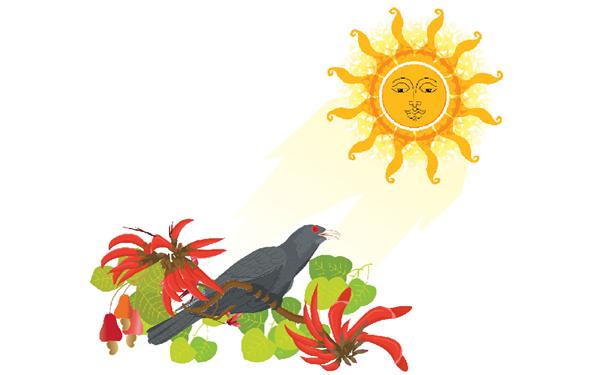
April (Sinhala Bak) is when the flowers bloom and trees bear fruit and nuts such as the cashew nut. It is also a season of festivity as the Sinhala and Tamil New Year falls mid – month, generally on April 13 and April 14. Sometimes, the New Year falls on April 12 and 13 but this does not happen often.
The harvest is brought home during this time.
The blooming of the beautiful red eramudu or erabudu flowers and the call of the koha (Sri Lankan cuckoo) tell us that the New Year is approaching and people start preparing for it. They clean and paint houses, repair roofs, discard old kitchen utensils and buy new ones, buy clothes in the auspicious colour given for the New Year. They also start preparing rasa kavili or sweetmeats.
Little children play in the sand by making cakes using coconut shells.
These cakes are called kom pittu and the children sing a song while making kom pittu.
Avuruddata gamata yanta
Kom pittu idiyo idiyo
(May kom pittu be baked
For us to vis go to the village)
Then comes the day of the old year or the Parana Avuruddha with its set of traditions like bathing for the Old Year.
The Nonagathey or the inauspicious time is before the dawn of the New Year. All work has to be stopped and no food or drink should be partaken of. Within the nonagathey time is the Punya kalaya or the time to perform meritorious deeds. People visit temples during this time.
Then comes the dawn of the New Year heralded by the pealing of temple bells, lighting of crackers and the playing of the rabana. The most important event, the lighting of the hearth takes place at the given auspicious time .
A pot of milk is boiled and it must overflow for good luck. This is called the kiri ithireema. Then the kiri bath or milk rice is prepared with the additional ingredients as stipulated.
The first meal is eaten again at an auspicious time and it is customary for the head of the household to feed a mouthful of kiribath to the other family members. Next comes the Ganu denu (transactions) and Weda allima. (starting of work). These will be followed by sharing of food with others, games and visiting. The fun of New Year has begun.
Hisa thel gama or the Nanu mura mangallya Hisa thel gama is the anointing of oil and this takes place on a day after the New Year.
A special oil is prepared and people either go to the temple to get themselves anointed or they collect the oil and an elder will anoint the other family members. Finally, people will leave for work on a given day, at an auspicious time for work.
They will usually wear clothes in an auspicious colour and partake of kiribath before they set off.
